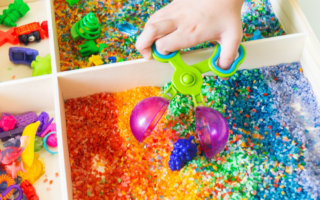The Journey to Raising Smart and Confident Kids.
Raising confident and smart children is one of the most rewarding experiences a parent can have. I remember a day when my daughter, Mia, came running to me with the biggest smile on her face. She had just solved a difficult puzzle on her own, something she had been working on for weeks. She was beaming with pride, not because she solved it in the fastest time but because she did it herself. It was one of those moments where I realized that confidence and independence don’t come from external praise but from internal growth and a sense of accomplishment.
As a father, my priority is to ensure Mia grows up knowing that she is capable of handling whatever challenges come her way. Raising a confident and independent child is a goal shared by many parents, yet it can be a bit daunting to figure out how to do so.
How can you cultivate these essential traits without hovering over them or making them feel like they have to grow up too fast? Well, I’m here to share with you 39 simple and effective ways to raise confident and independent kids—ways that will not only help them grow but will also make you proud of the young individuals they are becoming.
Why Confidence and Independence Matter
Confidence and smartness are two critical traits that play a significant role in a child’s development. A confident child is more likely to try new things, take risks, and believe in their abilities. They are not afraid of failure because they understand that mistakes are part of the learning process. On the other hand, an independent child develops self-sufficiency and problem-solving skills. These children can make decisions on their own, learn how to cope with challenges, and manage their emotions in healthy ways.
As parents, our role is to create an environment that nurtures these qualities. Confidence and independence are not just important for academic success; they lay the foundation for a fulfilling life, strong relationships, and a resilient mindset.
How to Raise Smart and Confident Kids
-
Encourage Problem-Solving from an Early Age
One of the first steps to raising an independent child is teaching them to think for themselves. When your child faces a challenge, instead of jumping in to solve the problem for them, try guiding them with questions that encourage critical thinking. For example, if Mia is having trouble figuring out how to assemble a toy, I might ask, “What do you think comes next?” or “How can we make this easier?” Giving your child the space to come up with their own solutions fosters a sense of accomplishment and builds their confidence.
-
Praise Effort, Not Just Results
We’ve all heard the phrase “Good job!” when our kids accomplish something, but it’s important to praise the effort, not just the outcome. Praising effort teaches children that hard work is more important than the result itself. I make it a point to tell Mia, “I’m so proud of how hard you worked on that project” rather than simply focusing on the fact that she finished it.
-
Allow Them to Make Choices
Making decisions is a powerful way to help kids build confidence. From choosing what to wear to deciding what’s for dinner, giving children the opportunity to make small choices helps them feel empowered. Even if Mia picks out an outfit that doesn’t match, I let her wear it because she took the initiative to make a choice and learned from it.
-
Teach Them to Manage Emotions
Emotional regulation is crucial for developing confidence and independence. Kids who can understand and manage their feelings are less likely to be overwhelmed by frustration or disappointment. I often encourage Mia to express how she’s feeling, whether she’s happy, sad, or angry, and we discuss healthy ways to deal with those emotions.
-
Set Realistic Expectations
Raising confident kids doesn’t mean expecting perfection. It’s essential to set realistic and achievable goals for them. Encourage them to push their limits, but also allow room for mistakes and growth. Setting the bar too high can cause frustration and undermine their self-esteem, while setting it too low can prevent them from developing resilience.
-
Let Them Take Risks
Confidence grows when children face and overcome challenges. While it’s tempting to protect them from all harm, allowing them to take safe risks, such as climbing a tree or trying out for a team, can build resilience and confidence. I remember the first time Mia climbed a tree on her own—I was nervous, but I was proud of her for trusting her abilities.
-
Foster a Growth Mindset
A growth mindset is the belief that abilities can be developed through dedication and hard work. Children with a growth mindset are more likely to persevere in the face of challenges. I frequently remind Mia that if something is difficult, it’s just an opportunity to learn and improve.
-
Be a Positive Role Model
Children learn by example. If you want your child to be confident and independent, you need to demonstrate these traits in your own life. Whether it’s speaking positively about your own abilities or tackling challenges head-on, your child will take notice and model your behavior.
-
Allow for Natural Consequences
While it’s difficult to watch your child face the consequences of their actions, it’s an essential part of their growth. Whether they forget their homework or lose a toy, natural consequences teach children responsibility and accountability. I always make sure to discuss what happened afterward and how they can prevent it from happening again.
-
Encourage Social Independence
Social skills are a huge part of developing confidence. Encourage your child to engage with others, make new friends, and participate in group activities. I’ve seen Mia grow in confidence when she interacts with other kids at school or plays in a group, as these experiences help her build trust in her social abilities.
Practical Tips: Implementing Confidence and Independence in Daily Life
-
Give Them Responsibilities
From setting the table to taking out the trash, giving children age-appropriate responsibilities teaches them that they are capable of contributing to the household. These tasks not only help build a sense of independence but also foster self-reliance and a sense of pride.
-
Allow for Free Play
Unstructured playtime is crucial for children to develop their creativity, problem-solving skills, and social confidence. Whether it’s building a fort in the living room or playing outside with friends, free play allows kids to explore their interests and learn to entertain themselves.
-
Encourage Self-Care and Hygiene
Teaching children to care for themselves promotes independence and self-confidence. Start with simple tasks like brushing their teeth, combing their hair, or getting dressed on their own. As they get older, encourage them to take on more complex tasks like managing their own schedule or packing their school bag.
-
Let Them Fail and Learn from It
Failure isn’t the end; it’s an opportunity for growth. When children experience failure, it’s important to help them view it as a learning experience rather than a setback. I make sure to talk to Mia after she faces failure, helping her to reflect on what went wrong and how she can improve next time.
-
Support Their Interests and Hobbies
Encouraging your child’s interests and hobbies can help them discover their strengths and passions, which builds confidence. Whether it’s playing an instrument, painting, or joining a sports team, supporting their passions gives them the tools to develop independence in areas they care about.
-
Practice Positive Affirmations
Positive affirmations are powerful tools for building self-esteem. Encourage your child to say affirming statements like, “I am smart,” “I can do this,” or “I am capable.”
These small phrases help children develop a positive self-image and remind them of their strengths. I practice this with Mia daily, especially before she tackles a new task, and I’ve seen how it boosts her confidence.
-
Teach Them How to Set Goals
Teaching children how to set and work toward goals is a key aspect of building confidence. Start with simple, achievable goals, and gradually encourage them to set bigger challenges.
My child loves to set goals for her schoolwork or even for personal projects, and we celebrate each milestone she achieves, helping her build a sense of accomplishment.
-
Build Strong Communication Skills
Being able to express themselves clearly helps children feel confident in social situations. Encourage your child to voice their thoughts and opinions, even if it’s something as simple as saying, “I’d like to do this instead” or “I need help with this.”
I’ve noticed that when Mia can communicate her thoughts, she feels more in control and confident in any situation.
-
Allow Space for Independence
Sometimes, the best way to foster independence is by giving your child some space. Let them tackle tasks on their own without hovering over them. Whether it’s cleaning their room or organizing their toys, this independence helps them develop a sense of responsibility and trust in their own abilities.
My child loves when she gets the chance to complete tasks independently, and it boosts her confidence significantly.
-
Make Them Part of Family Decisions
Involving your child in family decisions, whether it’s planning a weekend activity or deciding on a family meal, makes them feel valued and capable. Mia loves to have a say in what we do as a family, and her opinions matter to us.
This inclusion teaches her how to make decisions and understand the consequences of those choices.
-
Practice Patience
Learning to be patient with your child is vital for nurturing their growth. Children often need time to process new information or try something new. Instead of rushing them or doing things for them, practice patience as they figure things out on their own.
Patience allows children to take the time they need to develop self-confidence without feeling pressured.
-
Encourage Resilience
Resilience is the ability to bounce back from setbacks. Teach your child that it’s okay to fail, and show them how to get up and try again. Help them see challenges as opportunities to grow rather than obstacles to avoid.
Whenever My child’s faces a setback, I encourage her to try again and reassure her that mistakes are part of the journey.
-
Provide Opportunities for Leadership
Let your child take on leadership roles, whether at home or in group settings. Encourage them to lead a project, organize an event, or even help younger siblings. Leadership opportunities provide them with a sense of responsibility and control, which fosters confidence in their abilities to lead and make decisions.
-
Be a Good Listener
Listening attentively to your child’s thoughts, feelings, and concerns shows them that their voice matters. Being heard boosts their self-esteem and reinforces that their opinions are valued. Mia feels confident sharing her thoughts with me because I always make sure to listen carefully and validate her feelings.
-
Create a Positive Home Environment
A positive and supportive home environment is essential for raising confident children. Make sure your home is a place where your child feels safe, loved, and encouraged.
When kids feel supported by their family, they are more likely to take risks, try new things, and be confident in their abilities.
-
Limit Negative Criticism
While constructive criticism is important, too much negative criticism can have a detrimental effect on a child’s self-esteem. Instead of focusing on what they did wrong, focus on what they can improve and provide suggestions for how to do so.
Offering praise and encouragement, even during difficult moments, helps children learn and grow without feeling discouraged.
-
Teach Money Management
Teaching children the value of money and how to manage it responsibly fosters independence and confidence. Give your child a small allowance and encourage them to budget for their needs or wants.
My child loves to save for special items, and she feels proud when she reaches her savings goal independently.
-
Provide Opportunities for Creative Expression
Creative outlets such as drawing, painting, dancing, or writing provide children with the opportunity to express themselves freely. Creativity builds confidence as it allows them to explore their ideas and talents.
My child enjoys drawing and creating art, and every time she finishes a new piece, her confidence in her creative abilities grows.
-
Encourage Healthy Risk-Taking
Healthy risk-taking doesn’t mean recklessness; it’s about stepping out of one’s comfort zone to try something new. Encourage your child to take on challenges that push them but are not overwhelming.
Even if it’s trying a new sport or taking part in a school play, Mia thrives when she is encouraged to step outside of her comfort zone, and the experience always boosts her self-esteem.
-
Help Them Develop Time Management Skills
Teaching your child time management is an important way to foster independence. Encourage them to plan their daily schedule, prioritize tasks, and manage their time effectively.
My child enjoys organizing her day with me, and it helps her stay on top of her responsibilities while also providing her with a sense of control.
-
Foster Gratitude
Teaching children gratitude helps them develop a positive outlook and appreciate their accomplishments. Encourage your child to reflect on the things they are grateful for, whether it’s a good grade, a fun day spent with family, or their own abilities.
Mia has a gratitude journal where she writes down what she’s thankful for each day, which has positively impacted her mindset and confidence.
-
Celebrate Their Successes
Celebrating your child’s successes, both big and small, reinforces their self-worth and encourages them to keep working toward their goals. Whether it’s completing a school project or learning a new skill, take time to acknowledge their achievements.
I make sure to celebrate every success with Mia, no matter how small, as it shows her that her efforts are always appreciated.
-
Encourage Positive Peer Relationships
Help your child develop strong, positive relationships with their peers. Encouraging social independence by allowing them to form friendships, resolve conflicts, and work as part of a team builds confidence and social skills.
My child has developed wonderful friendships, and seeing her interact with her peers makes me proud of her social confidence.
-
Teach Them How to Cope with Stress
Stress is a part of life, but how we cope with it makes all the difference. Teach your child healthy coping mechanisms, such as deep breathing, taking breaks, or talking to someone when they feel overwhelmed.
When my child feels stressed, we practice deep breathing together, and it helps her manage her emotions in a healthy way.
-
Show Affection and Support
Demonstrating love and support is crucial for building your child’s confidence. When children know that they are loved unconditionally, they feel secure and confident in themselves.
I make sure to give My child plenty of hugs, words of encouragement, and reassurance, letting her know that no matter what, she is always loved and supported.
-
Encourage Healthy Competition
Competition, when done healthily, can teach children valuable lessons about hard work, perseverance, and self-improvement.
Encourage your child to participate in friendly competition, whether in sports, academics, or other activities, and help them focus on doing their best rather than just winning.
My child loves playing board games with friends, and I’ve seen how these experiences teach her valuable lessons in sportsmanship and self-confidence.
RELATED:
Intentional Parenting for Strong-Willed Children
-
Show Them How to Handle Criticism
Teaching children how to handle constructive criticism helps them grow without feeling discouraged. Encourage them to view criticism as an opportunity for improvement rather than as a personal attack. When Mia receives feedback, we discuss it together, and I emphasize how it can help her become better at whatever she’s doing.
-
Teach Them to Help Others
Encourage your child to be kind and helpful to others. Volunteering, assisting a friend in need, or simply doing a good deed can build empathy and make children feel good about themselves. Mia loves to help others, and whenever she does, it boosts her confidence as she realizes that her actions have a positive impact on others.
-
Let Them Be Themselves
Above all, the most important thing you can do as a parent is to allow your child to be their authentic self. Encourage them to embrace their unique qualities and not feel pressured to conform to societal standards or expectations.
When children feel free to be themselves, they develop a strong sense of identity and confidence. I always tell Mia that she’s perfect just the way she is, and I see her confidence grow as she embraces who she truly is.
Raising confident and independent kids doesn’t happen overnight. It takes time, patience, and consistent effort. But when you see your child standing tall with a sense of pride in their abilities, taking initiative, and confidently navigating the world, it’s all worth it.
By providing opportunities for growth, encouraging independence, and offering your support, you’re setting your child up for success in every aspect of their life.
As parents, we all want the best for our children. Confidence and independence are not just desirable traits; they are essential for a happy, successful life. So, take a deep breath, embrace the journey, and watch your child grow into the confident, independent individual they were meant to be.
Parenting is an ongoing journey of learning, trial, and error. Some days will be easier than others, but when you stay committed to nurturing your child’s confidence and independence, you’ll reap the rewards for years to come.




